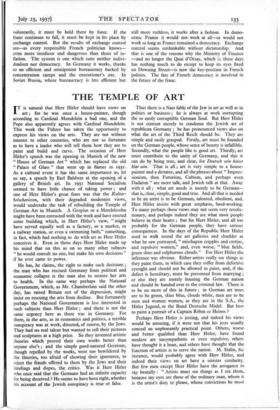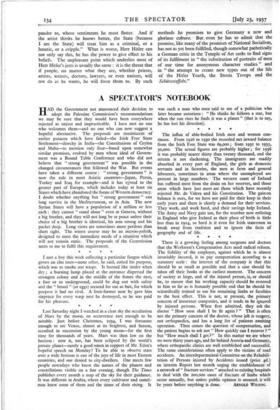THE TEMPLE OF ART
IT is natural that Herr Hitler should have views on art ; for he was once a house-painter, though according to Cardinal Mundelein a bad one, and the Pope also apparently agrees with Cardinal Mundelein. This week the Fiihrer has taken the opportunity to express his views on the arts. They are not without interest to other countries, who are not so fortunate as to have a leader who will tell them how they are to paint and build and carve. The occasion of Herr Hitler's speech was the opening in Munich of the new " House of German Art " which has replaced the old " Palace of Glass " that went up in flames in 1931. As a cultural event it has the same importance as, let us say, a speech by Earl Baldwin at the opening of a gallery of British art. In 1931 National Socialism seemed to have little chance of taking power ; and one of Herr Hitler's great fears was that the Kultur- bolschevisten, with their degraded modernist views, would undertake the task of rebuilding the Temple of German Art in Munich. A Gropius or a Mendelssohn might have been entrusted with the work and have erected some building which, in Herr Hitler's view, " might have served equally well as a factory, or a market, or a railway station, or even a swimming bath," something, in fact, which had nothing to do with art as Herr Hitler conceives it. Even in those days- Herr Hitler made up his mind that on this as on so many other subjects " he would consult no one, but make his own decisions " if he ever came to power.
He has, he claims, the right to make such decisions ; the man who, has rescued Germany from political and economic collapse is the man also to restore her arts to health. In the same way perhaps the National Government, which, as Mr. Chamberlain said the other day, has raised Britain out of the depression, might insist on rescuing the arts from decline. But fortunately perhaps the National Government is less interested in such subjects than Herr Hitler ; and there is not the same urgency here as there was in Germany. For there, in the arts, as in economics and politics, a terrible conspiracy was at work, directed, of course, by the Jews. They had no real talent but wanted to sell their pictures and sculptures at a high price. So they invented artistic theories which proved their own works better than anyone else's ; and the simple good-natured Germans, though repelled by the works, were too bewildered by the theories, too afraid of showing their ignorance, to reject the frauds offered to them by the Jews and their hirelings and dupes, the critics. Was it Herr Hitler who once said that the Germans had an infinite capacity for being deceived ? He seems to have been right, whether his account of the Jewish conspiracy is true or false. Thus there is a Nazi fable of the Jew in art as well as in politics or business ; he is always at work corrupting the so easily corruptible German Soul. But Herr Hitler is not content merely to condemn the Jewish art of republican Germany ; he has pronounced views also on what the art of the Third Reich should be. They are simple and easily grasped. Firstly, art must be founded on the German people, whose sense of beauty is infallible. Secondly, what the people like is good art. Thirdly, art must contribute to the unity of Germany, and this it can do by being true, and clear, for Deutsch sein heisst klar sein. That is all ; art is very simple to a house- painter and a dictator, and all the phrases about " Impres- sionism, then Futurism, Cubism, and perhaps even Dadaism " are mere talk, and Jewish talk at that. Away with it all ; what art needs is merely to be German— that is, clear, simple, good and true. And all that is needed to be an artist is to be German, talented, obedient, and, Herr Hitler insists with great emphasis, hard-working. To many perhaps these views may not seem very revolu- tionary, and perhaps indeed they are what most people believe in their hearts ; but for Herr Hitler, and all too probably for the German people, they have serious consequences. In the days of the Republic Herr Hitler used to walk round the art galleries and shudder at what he saw portrayed, " misshapen cripples and cretins, and repulsive women," and, even worse, " blue fields, green skies and sulphurous clouds." For Herr Hitler the inference was obvious. Either artists really see things as they paint them, in which case they suffer from defective eyesight and should not be allowed to paint, and, if the defect is hereditary, must be prevented from marrying ; or else they are merely hoaxing the German nation and should be handed over to the criminal law. There is to be no more of this in future ; in German art trees are to be green, skies blue, clouds white, men are to be men and women women, as they are in the S.A., the Hitler Jugend, or the Bund Deutsche Madel. But how to paint a portrait of a Captain Rohm or Heines ?
Perhaps Herr Hitler is jesting, and indeed his views would be amusing, if it were not that his jests usually conceal an unpleasantly practical point. Others, worse and better qualified than Herr Hitler, have found modern art unsympathetic or even repulsive, others have thought it a hoax, and others have thought that the function of artists is to serve the nation. M. Stalin, for instance, would probably agree with Herr Hitler, and indeed their views on art have a sinister similarity. But few men except Herr Hitler have the arrogance to say brutally : " Artists must see things as I see them, because my eyes are those of the ordinary man, whom it is the artist's duty to please, whose convictions he must pander to, whose sentiments he must flatter. And if the artist thinks he knows better, the State (because I am the State) will treat him as a criminal, or a lunatic, or a cripple." What is worse, Herr Hitler can not only say this, he has the power to give effect to his beliefs. The unpleasant point which underlies most of Herr Hitler's jests is usually the same : it is the threat that if people, no matter what they are, whether priests, artists, writers, doctors, lawyers, or even nations, will not do as he wants, he will force them to. By such methods he promises to give Germany a new and glorious culture. - But. even he has to admit that the promise, like many of the promises of National Socialism, has not as yet been fulfilled, though somewhat pathetically a German critic in the Temple of Art seeks to find signs of its fulfilment in " the 'substitution of portraits of-men of our time for anonymous character studies " and in " the attempt to create new types out of the life of the Hitler Youth, the Storm Troops and the Schiitzstaffeln."































































 Previous page
Previous page